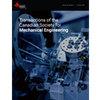考虑稳定性与经济性协调的分布式驱动电动汽车转矩矢量控制算法
IF 1
4区 工程技术
Q4 ENGINEERING, MECHANICAL
Transactions of The Canadian Society for Mechanical Engineering
Pub Date : 2022-08-02
DOI:10.1139/tcsme-2022-0053
引用次数: 1
摘要
分布式驱动电动汽车行驶时应考虑轮毂电机在高效率区域工作和轮胎打滑最小。为此,提出了一种新的扭矩矢量控制算法,该算法由线性二次型调节器(LQR)和比例积分(PI)控制模块组成,在控制器上分别计算期望的附加偏航力矩和总驱动力矩,以满足期望的偏航角速度、侧滑角和纵向速度。在下位控制器中分别建立了考虑轮胎工作载荷的稳定性目标函数和考虑轮胎滑动能量和自卸车工作效率的经济性目标函数。采用相平面法得到了横向稳定性与经济性协调的适应度函数。针对DDEV的转矩分配问题,提出了一种具有优越初始种群的粒子群优化算法(SIP-PSO)求解转矩分配系数。最后,低附着路面上DLC和SLC机动的仿真和半在环(HIL)测试结果表明,该算法在保证不同工况下的横向稳定性的情况下,能有效降低IWMs工作时的能量损失和轮胎打滑。本文章由计算机程序翻译,如有差异,请以英文原文为准。
Torque Vectoring Algorithm for Distributed Drive Electric Vehicle Considering Coordination of Stability and Economy
Working in high-efficiency areas for in-wheel motors (IWMs) and minimum tires slip should be considered when driving for distributed drive electric vehicles (DDEV). Therefore, a novel torque vectoring control algorithm is proposed to lower energy dissipation and ensure lateral stability, which consists of a linear quadratic regulator (LQR) and a Proportion Integration (PI) control module in upper controller to calculate desired additional yaw-moment and total driving torque respectively for following desired yaw rate, side slip angle and longitudinal velocity. In addition, the stability objective function considering tires working load and the economic objective function considering working efficiency of IWMs and tires slip energy are established separately in lower controller. The fitness function of coordinating lateral stability and economy is obtained by phase plane method. Particle swarm optimization (PSO) algorithm with a superior initial population (SIP-PSO) is proposed to solve torque distribution coefficients for torque distribution of DDEV. Finally, simulation and hardware-in-the-loop (HIL) test results under DLC and SLC maneuvers on lower adhesion road indicate that the proposed algorithm can effectively lower the energy loss of IWMs working and tires slip when ensuring lateral stability under different working conditions.
求助全文
通过发布文献求助,成功后即可免费获取论文全文。
去求助
来源期刊
CiteScore
2.30
自引率
0.00%
发文量
53
审稿时长
5 months
期刊介绍:
Published since 1972, Transactions of the Canadian Society for Mechanical Engineering is a quarterly journal that publishes comprehensive research articles and notes in the broad field of mechanical engineering. New advances in energy systems, biomechanics, engineering analysis and design, environmental engineering, materials technology, advanced manufacturing, mechatronics, MEMS, nanotechnology, thermo-fluids engineering, and transportation systems are featured.

 求助内容:
求助内容: 应助结果提醒方式:
应助结果提醒方式:


